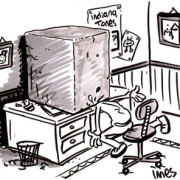Quick Tricks to Speed up Your Writing
Writing is something that can come naturally at times, but at other times it can take lots of willpower to muster. If you find that you easily run into writer’s block, there are a few strategies you can implement to get around the lack of creativity and spark productivity.
1. Make an Outline
Many writers make the mistake of immediately jumping into their piece without a plan or outline in place. They might have a solid introduction in mind, but when it’s time to start writing the meat and potatoes of the piece, they draw blanks. This is because there is no direction or outline in place. This can easily be combated by taking the time before starting the piece to create a solid outline with major points and topic sentences. This will help by showing you exactly what to write about, and it will greatly reduce the chance that you’ll wander off topic or get stuck.
2. Take Advantage of Your Spurts of Creativity
Simply enough – if you’re not feeling creative, then don’t write. Try to note your patterns of creativity. Maybe you feel like writing the most during the morning. Maybe you’re a night owl and you like to write at night time. Whatever the case, carve out some time to write when you feel most productive.
3. Write First, Edit Later
Many people make the mistake of trying to correct their mistakes and edit while they’re still in the writing/drafting phase of their piece. Jumping between writing and editing can slow down the overall writing process, and it can even cause you to lose your train of thought or motivation. Make it a point to not worry about the editing process until the piece is officially finished. Once you’ve created a basic draft, go back and spend some time solely editing.
4. Break Up Your Writing into Sessions
You can also try to break up your writing into sessions for easier flow and quicker production time. Trying to get out lots of content in one sitting can seem overwhelming, and in turn, it can dull your creativity and exhaust you. Either take frequent breaks or designate various times throughout the day to work on your piece. You will find that it’s a lot easier to look at your piece as a 10 part task rather than a huge chore.
5. Use a Timer
Lastly, try using a timer to get blocks of work done. For example, you can allow yourself an hour for each section of a piece. Using a timer to ensure this creates a sense of competitiveness, and it creates somewhat of a deadline to get your work done. You can set a timer for the entire piece, or you can break it up into smaller segments. Either way, you should see an improvement in your overall production time.
Speeding up your writing shouldn’t have to feel like a chore. Try implementing various strategies such as using timers, making outlines, or editing later to slash your production time into a fraction. Most of all, remember that writing takes practice and it will come more naturally and easily over time!








Leave a Reply
Want to join the discussion?Feel free to contribute!